Headline News Archive
 By Megan Mascheri (FAU Center for Environmental Studies)
By Megan Mascheri (FAU Center for Environmental Studies)
A Q&A with Jeff Berardelli, chief meteorologist and climate specialist at WFLA News Channel 8 in Tampa.
Read the full discussion here.
 By Mary Anna Mancuso (RepublicEn.org)
By Mary Anna Mancuso (RepublicEn.org)
The warming planet and marine waters are bringing the topic of climate change and solutions to the forefront of conversations.
Read Mancuso's full article here.
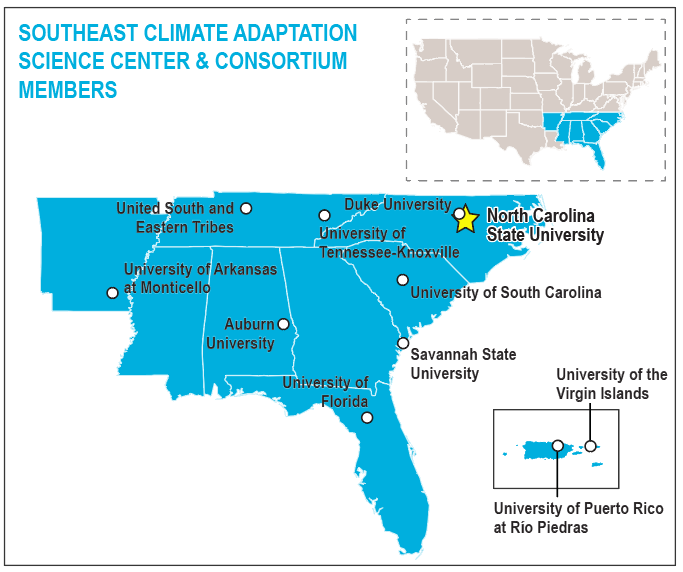 North Carolina State University has been awarded a new cooperative agreement from the U.S. Geological Survey to continue to host the Southeast Climate Adaptation Science Center (SE CASC) for the next five years. The award caps over 12 years of success as the host organization for the Southeast Climate Adaptation Science Center.
North Carolina State University has been awarded a new cooperative agreement from the U.S. Geological Survey to continue to host the Southeast Climate Adaptation Science Center (SE CASC) for the next five years. The award caps over 12 years of success as the host organization for the Southeast Climate Adaptation Science Center.
Read the full news release here.

Will Charouhis was inspired to create a youth-led group to combat climate change by flooding in Miami from Hurricane Irma in 2017. At just 13 years old, Charouhis founded the nonprofit We Are Forces of Nature. Now 17, his continuing work on climate issues includes a project aimed at helping 1 million mangroves thrive.
Will Charouhis leads the project “A Million Mangroves: Halting Climate Change One Root at a Time”. Invading Sea readers might know Charouhis from the opinion pieces that he’s written for this website, including a piece on a speech by Jane Goodall in Miami. He serves on the Jane Goodall Institute’s USA Roots & Shoots National Youth Leadership Council.
He leads the project “A Million Mangroves: Halting Climate Change One Root at a Time” for the organization. The project is intended to regenerate mangrove forests that absorb greenhouse gas emissions, protect against coastal erosion and provide habitat for marine life.
At the beginning of the pandemic lockdown in 2020, Charouhis purchased a used kayak and started cleaning up mangroves near his home. When restrictions loosened, he began conducting monthly cleanups with his friends, cleaning up six miles of mangroves stretching down to the Florida Keys.
He also started planting mangroves, experimenting with ways to help ensure the plants survive. Young people around Miami have joined Forces of Nature in the planting effort, including a large planting on Virginia Key.
New research, published in Nature Climate Change, shows more detailed role of salt marshes, fjords
Coastal ecosystems globally lock away more carbon dioxide than they release, but emissions of two other greenhouse gases – methane and nitrous oxide – counteract that to a degree, according to international researchers led by Australia’s Southern Cross University that include a University of Florida biogeochemist.
The new findings of the coastal greenhouse gas balance in 10 regions globally are outlined in the paper published in Nature Climate Change.
From tropical lagoons to polar fjords, from coastal mangrove forests to underwater seagrass communities, many coastlines around the world show high diversity in greenhouse gas sinks and emissions.
Read the full article featured in UF Liberal Arts and Sciences NEWS

The Envision Resilience Challenge kicks off third year with UF architecture team again participating
 The 2023 Envision Resilience New Bedford and Fairhaven Challenge participating universities are the Rhode Island School of Design, Northeastern University, the University of Florida, the University of Massachusetts Amherst, the University of Massachusetts Dartmouth and the University of Virginia. The Envision Resilience Challenge, a semester-long design studio and community engagement initiative connects interdisciplinary teams from leading universities with coastal communities to imagine resilient pathways in the face of climate change through adaptive design. Since its inception three years ago, the program has worked with more than 200 students from nine universities to serve the six coastal communities of Nantucket, Wickford, Warren, Providence, Aquidneck Island and Barrington. Carolyn Cox of the FCI helps with the academic coordination of this initiative to give UF students the opportunity to work across universities, disciplines, and geographies.
The 2023 Envision Resilience New Bedford and Fairhaven Challenge participating universities are the Rhode Island School of Design, Northeastern University, the University of Florida, the University of Massachusetts Amherst, the University of Massachusetts Dartmouth and the University of Virginia. The Envision Resilience Challenge, a semester-long design studio and community engagement initiative connects interdisciplinary teams from leading universities with coastal communities to imagine resilient pathways in the face of climate change through adaptive design. Since its inception three years ago, the program has worked with more than 200 students from nine universities to serve the six coastal communities of Nantucket, Wickford, Warren, Providence, Aquidneck Island and Barrington. Carolyn Cox of the FCI helps with the academic coordination of this initiative to give UF students the opportunity to work across universities, disciplines, and geographies.
Once the whaling capital of the world and now home to the highest-earning fishing port in the country, New Bedford and Fairhaven have long been defined by their connection to the water. Like coastal communities around the world, these seaport towns are facing rising sea levels, increasingly hotter temperatures and more frequent and intensifying storms. Envision Resilience students this year will once again be tasked with identifying threats, researching possible solutions and proposing innovative ways of living under future conditions that address issues of environment, housing, transportation, equity, local industry, ecology and resilience. A cohort of community advisors will serve as liaisons between the student teams and the communities so that outcomes reflect the values, cultures and needs of the people.
“The 2022 Envision Resilience Narragansett Bay Challenge opened up my thinking to what's possible,” said climate consultant Curt Spalding, U.S. Environmental Protection Agency Administrator under the Obama Administration and the former executive director of Save the Bay. “It raised the bar for developing a longer-term effort for planning across Rhode Island communities. There is no doubt of the impact this program will have on the New Bedford and Fairhaven communities.”
Each year, final designs of the Envision Resilience Challenge are presented to the community through a number of local events and a multi-month exhibition. To date, these designs have reimagined coastal edges and urban systems through nature-based solutions in vulnerable areas and regenerative systems in a post-carbon economy and explored new ways of living that embrace healthy, sustainable and equitable systems. From floating wharves and raised streetscapes to living, integrated shorelines and net-zero buildings that use hemp lime construction, the student work has inspired conversations on how local residents can work together to consider adaptive waterfronts and neighborhoods that benefit people, ecosystems, recreation and resilience.
Click here to see designs from previous challenges in Nantucket and Narragansett Bay.
Please join us in congratulating our 6 new FCI Student Climate Fellows!
Each submitted outstanding original ideas for exploring climate-related research projects AND plans to communicate their findings. This program will not only help prepare our next generation of climate leaders, but it will also help inform communities in Florida about these urgent issues.
Check out these new fellows and stay tuned for more FCI opportunities!
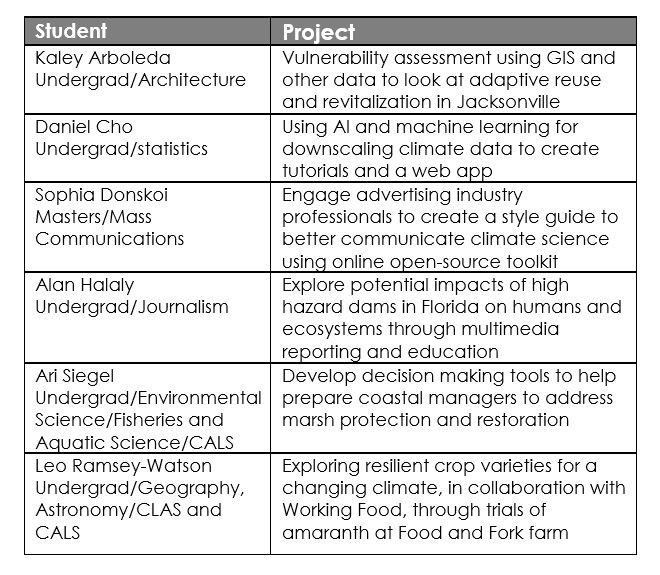
This interdisciplinary studio, led by the University of Florida, proposes a series of “suburban retrofits” to envision greater resilience, equity, and sustainability in Southwest Florida, which was recently devastated by Hurricane Ian. Multi-disciplinary teams focus on the city of Cape Coral, a poster child for Florida’s rampant post World War II suburban development, to explore design interventions systems at the scale of city and neighborhood.
Through a series of architectural designs, landscape infrastructures, planning/policy interventions, as well as multimedia tools to reimagine a transformed “civic core,” student teams visualize different possible futures for the study area. Design interventions culminate in the creation of an interactive “digital twin” using the Unreal Engine platform.
Funded by the National Academies of science (NAS) Gulf Research Program (GRP), the GulfSouth “super-studio” combines architecture, landscape architecture, urban and regional planning, as well as journalism and construction management students to explore the critical challenges facing the Gulf of Mexico’s coastline and communities. UF was one of five universities awarded funding for the creation of interdisciplinary architectural studio design courses that engage with the unique challenges and opportunities of the Gulf of Mexico region.
On Tuesday, April 25, professionals and academics from across the Gulf South joined students to discuss and evaluate the design studio proposals. The audience asked questions and provided ideas and considerations for future iterations of the students' designs, and students explained their thought and creation processes. Students also shared their experience and outputs working with the UnReal Engine platform to demonstrate how their projects would look and feel using the digital medium. Overall, the class accomplished its main goal: people came together across fields to imagine a more resilient, more innovative future for Cape Coral.
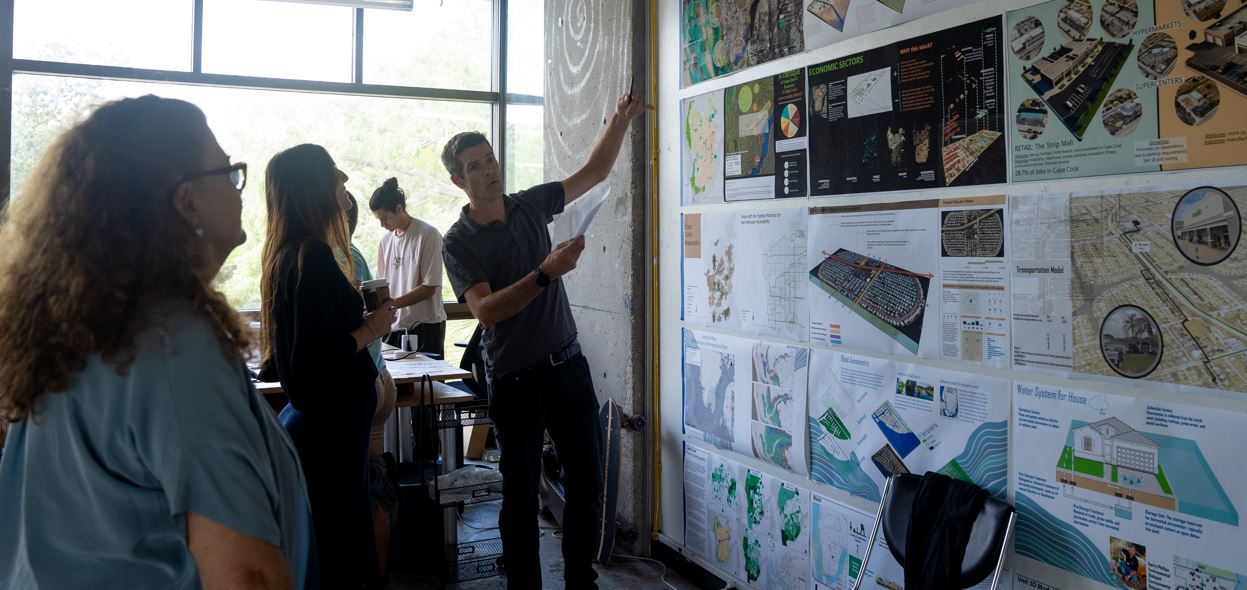
The Coastal Flood Resilience Project recently provided Congress with a letter advocating increased funding for the National Science Foundation to expand research of glacier and ice sheet loss as needed to improve projections of sea level rise and support communities developing coastal flood resilience plans.

There are multiple, feasible and effective options to reduce greenhouse gas emissions and adapt to human-caused climate change, and they are available now, said scientists in the latest Intergovernmental Panel on Climate Change (IPCC) report released March 20.
The IPCC's latest synthesis report is over 8000 pages long. World Resources Institute did a fantastic job capturing the 10 key takeaways of this dire warning to humanity.
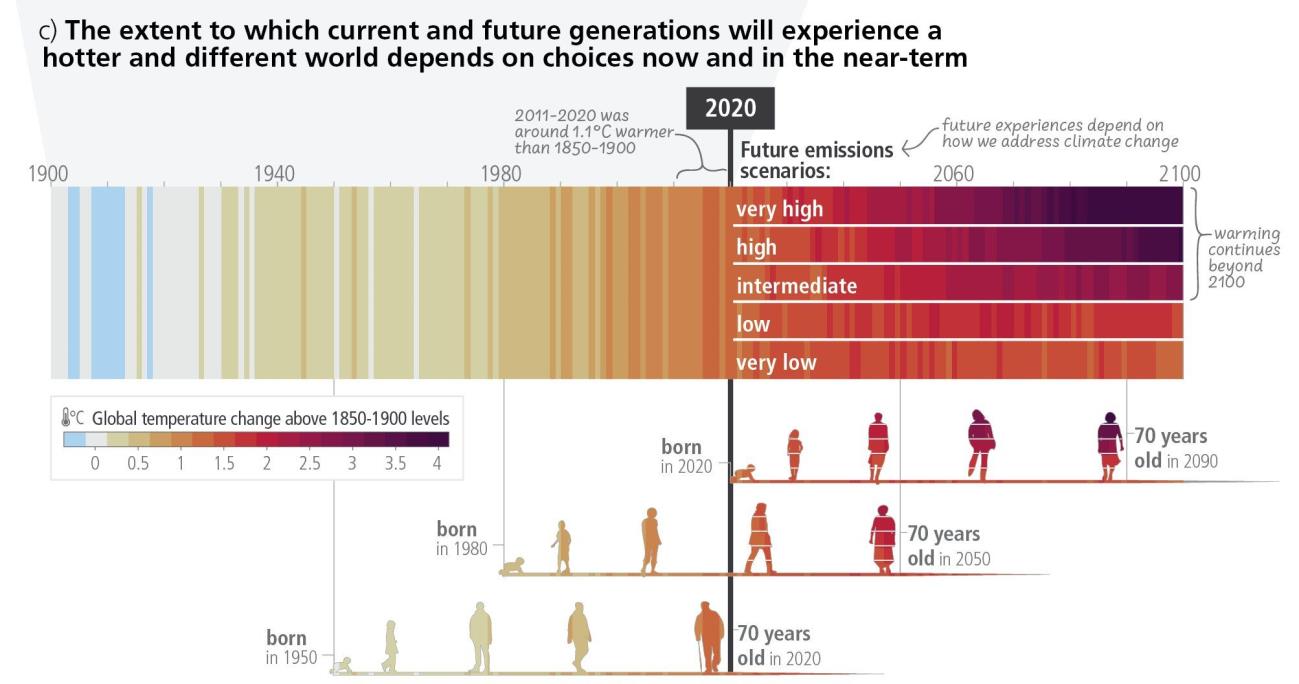 Main points:
Main points:
1. Human-induced global warming of 1.1 degrees C has spurred changes to the Earth’s climate that are unprecedented in recent human history.
2. Climate impacts on people and ecosystems are more widespread and severe than expected, and future risks will escalate rapidly with every fraction of a degree of warming.
3. Adaptation measures can effectively build resilience, but more finance is needed to scale solutions.
4. Some climate impacts are already so severe they cannot be adapted to, leading to losses and damages.
5. Global GHG emissions peak before 2025 in 1.5 degrees C-aligned pathways.
6. The world must rapidly shift away from burning fossil fuels — the number one cause of the climate crisis.
7. We also need urgent, systemwide transformations to secure a net-zero, climate-resilient future.
8. Carbon removal is now essential to limit global temperature rise to 1.5 degrees C.
9. Climate finance for both mitigation and adaptation must increase dramatically this decade.
10. Climate change — as well as our collective efforts to adapt to and mitigate it — will exacerbate inequity should we fail to ensure a just transition.
More information available at https://www.ipcc.ch/2023/03/20/press-release-ar6-synthesis-report/
Read the full AR6 Synthesis Report
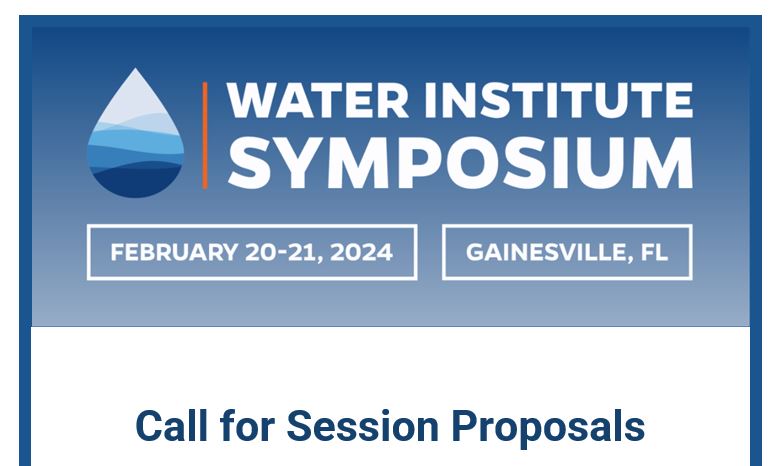 For the first time, the UF Water Institute is issuing an open call to the water science, technology, education, policy, management and stakeholder community to assist with developing our symposium agenda!
For the first time, the UF Water Institute is issuing an open call to the water science, technology, education, policy, management and stakeholder community to assist with developing our symposium agenda!
We invite you to propose a session related to your interests & expertise:
1. Water Quality Drivers & Impacts on Public, Wildlife & Ecosystem Health
2. Water Scarcity, Allocation & Reuse
3. Building Resilience to Climate Change & Sea Level Rise
4. AI/Machine Learning, Big Data & Convergent Science for Water Systems
5. Water Governance & Environmental Justice
6. Intersecting Science, Stakeholders & Decision-Making
7. Education, Technology & Decision Tools for Improved Water Management
8. Hydro-ecologic Connections Across the Land-Sea Continuum
*Sessions do not need to be limited to these areas.
The symposium seeks to capture all emerging issues and new ideas.
The deadline to submit a proposal is Monday, July 10, 2023.
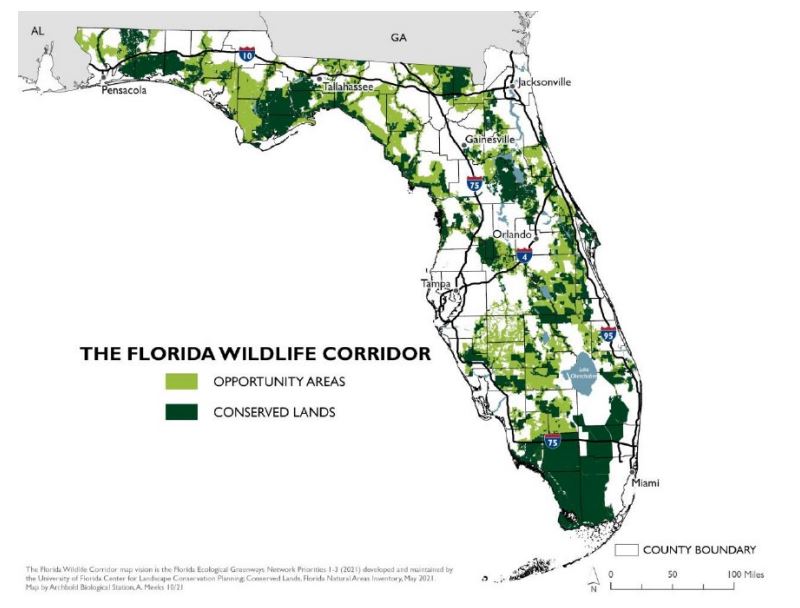 March 17, 2023 – Gainesville, Fla. – A fully-connected Florida Wildlife Corridor could roughly double the permanent protection of many water resources critical to the state’s ecology and economy, according to a first-of-its-kind study led by the University of Florida Water Institute.
March 17, 2023 – Gainesville, Fla. – A fully-connected Florida Wildlife Corridor could roughly double the permanent protection of many water resources critical to the state’s ecology and economy, according to a first-of-its-kind study led by the University of Florida Water Institute.
The report, commissioned by Archbold Biological Station and the Live Wildly Foundation, found that protecting the remaining 46% of the Corridor would help conserve critical aquatic and coastal ecosystems. This includes freshwater wetlands, rivers, springs and estuaries, which serve as habitat to at-risk species like storks, heron and manatees, as well as fulfill crucial ecosystem functions.
“While the Florida Wildlife Corridor was not designed specifically as a water-protection plan, our findings show that, if fully connected, the Corridor will provide many water benefits,” said Wendy Graham, director of the UF Water Institute. “We were particularly impressed by the level of protection land conservation offered wetlands and rivers. This shows the potential to develop a healthy surface water ecosystem throughout our state, and thus protect wildlife habitat, store carbon and preserve Florida’s nature.”
Read the full press release
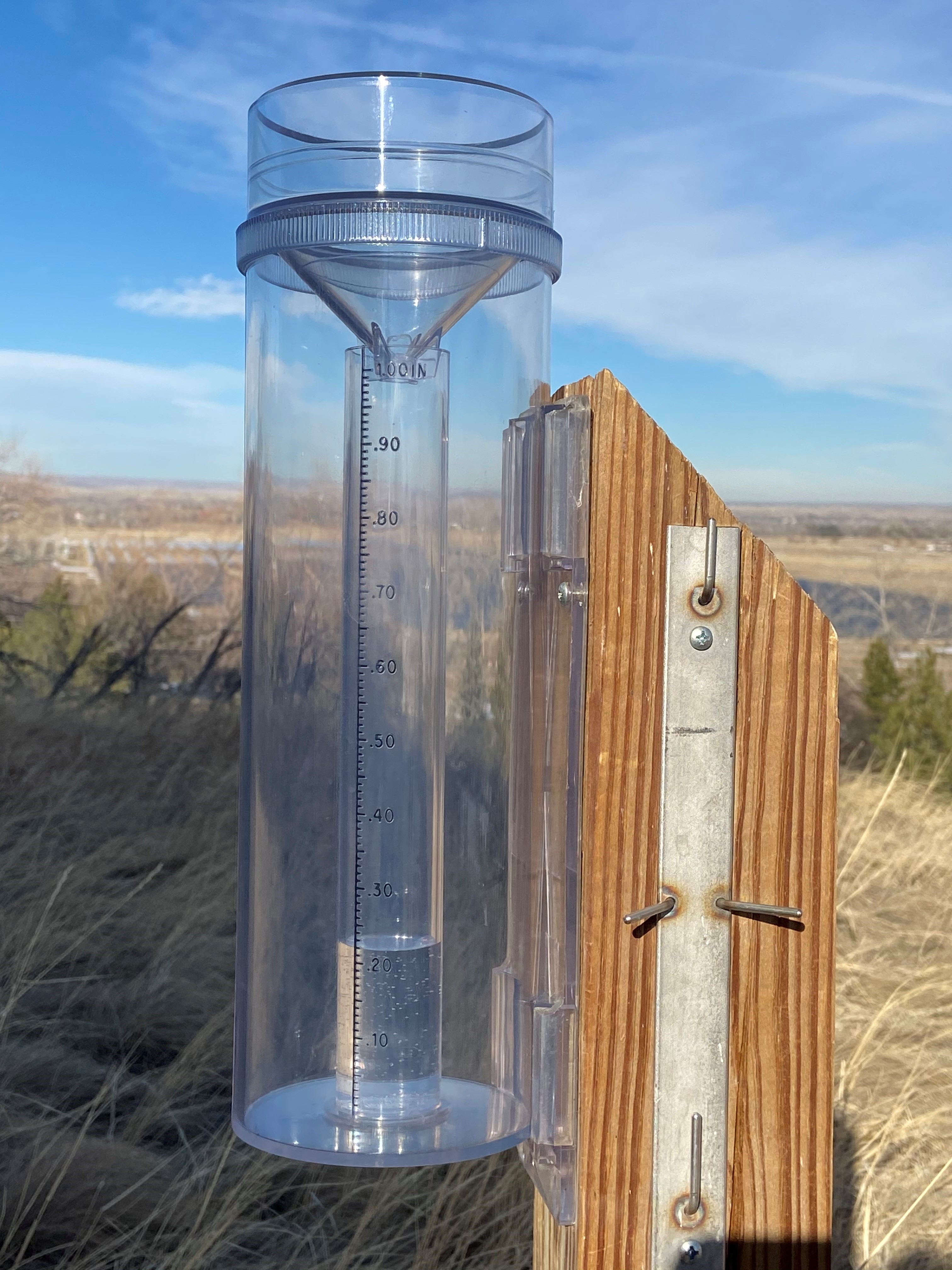 Ever notice how it rains at the airport and sometimes not at your house? Rainfall can be quite variable, especially here in Florida. Join thousands of other Citizen Scientist’s who observer and report rainfall in their backyards using a simple plastic rain gauge. CoCoRaHS, the Community Collaborative Rain, Hail and Snow network, celebrating its 25th anniversary this year, is looking for everyday folks to help measure rainfall at their locations. It’s easy and fun and only takes five minutes a day. Over 25,000 folks in six different countries are helping scientist’s, researchers and those at the National Weather Service fill in the gaps on the map with their measurements. The data is used daily and can make a real difference. To become a rainfall volunteer, visit www.cocorahs.org and sign up today. We can really use your help in Northern Florida!
Ever notice how it rains at the airport and sometimes not at your house? Rainfall can be quite variable, especially here in Florida. Join thousands of other Citizen Scientist’s who observer and report rainfall in their backyards using a simple plastic rain gauge. CoCoRaHS, the Community Collaborative Rain, Hail and Snow network, celebrating its 25th anniversary this year, is looking for everyday folks to help measure rainfall at their locations. It’s easy and fun and only takes five minutes a day. Over 25,000 folks in six different countries are helping scientist’s, researchers and those at the National Weather Service fill in the gaps on the map with their measurements. The data is used daily and can make a real difference. To become a rainfall volunteer, visit www.cocorahs.org and sign up today. We can really use your help in Northern Florida!
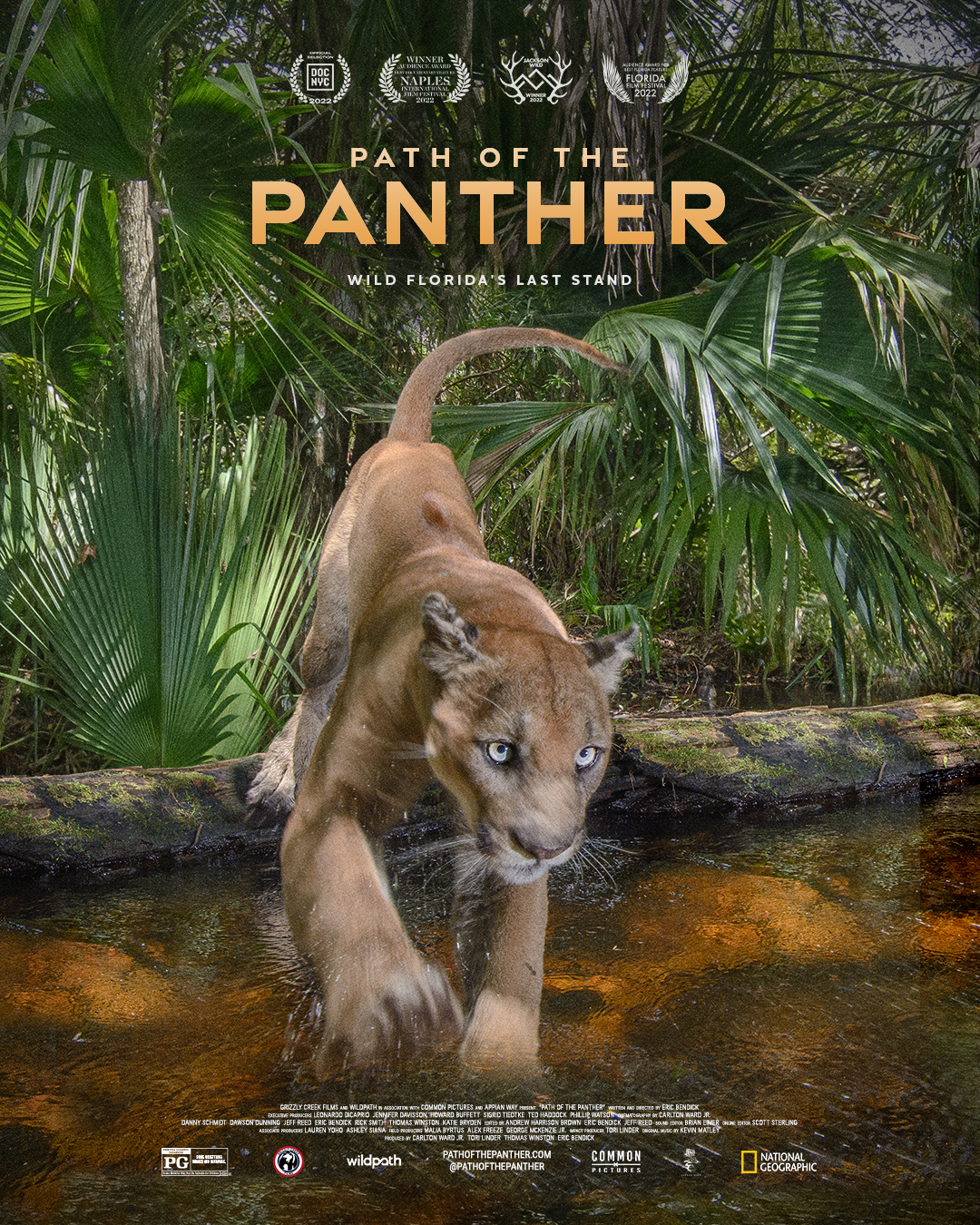
Check out Path of the Panther in a Florida theater!
Drawn in by the haunting specter of the Florida panther, a wildlife photographer, veterinarians, ranchers, conservationists, and indigenous people find themselves on the front lines of an accelerating battle between forces of renewal and destruction that have pushed the Everglades to the brink of ecological collapse.
In a struggle resonating across the globe, the panther’s habitat has become an island. Its lush territory transformed into subdivisions. A paradise vanishing into thin air.
Please support this stunningly beautiful film in your local theaters.
Playing throughout Florida now.
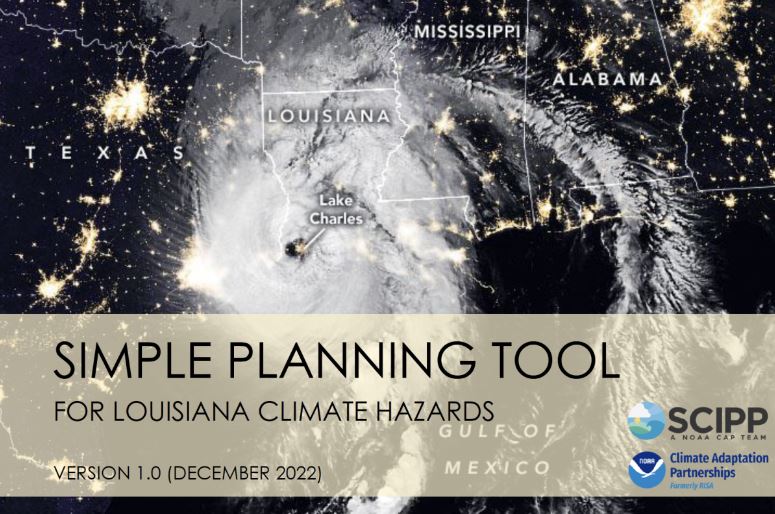 The Southern Climate Impacts Planning Program (SCIPP) is happy to announce the expansion of the Simple Planning Tool to Louisiana. The tool is now available for all states in the SCIPP region: Oklahoma, Arkansas, Texas, and Louisiana. The Simple Planning Tool assists planners, emergency managers, and decision makers in Louisiana who are assessing their long-term climate risks, both historically and in the future. The tool was primarily designed for decision makers who serve small- to medium-sized communities but may also be of interest to those who serve larger areas. The tool is now available here, or on our Tools page.
The Southern Climate Impacts Planning Program (SCIPP) is happy to announce the expansion of the Simple Planning Tool to Louisiana. The tool is now available for all states in the SCIPP region: Oklahoma, Arkansas, Texas, and Louisiana. The Simple Planning Tool assists planners, emergency managers, and decision makers in Louisiana who are assessing their long-term climate risks, both historically and in the future. The tool was primarily designed for decision makers who serve small- to medium-sized communities but may also be of interest to those who serve larger areas. The tool is now available here, or on our Tools page.
The Simple Planning Tool for Louisiana Climate Hazards is a compilation of relatively easy-to-use online interactive tools, maps, and graphs relevant to 17 hazards: 14 climate hazards and 3 non-climate hazards. Users can access and obtain locally relevant data from the provided links and instructions. It also provides information on data limitations and a state-of-the-science summary on projected future trends for each hazard. Finally, appendices include hazard definitions and descriptions, historical FEMA/presidential disaster declarations, climate change science and projection resources, and incentive and action programs for hazard risk reduction. The vast number of weather and climate tools available can be overwhelming, so this tool aims to cut through the internet clutter and point to relatively simple data tools that can be used during planning processes and in plans.
SCIPP is one of several National Oceanic and Atmospheric Administration (NOAA) Climate Adaptation Partnerships (CAP) teams, formerly named Regional Integrated Sciences and Assessments, and assists organizations with decision making that builds resilience by collaboratively producing research, tools, and knowledge that reduce weather and climate risks and impacts across the south-central U.S. Learn more about SCIPP at www.southernclimate.org.
by Renee Cho
January 12, 2023
The favored refrain of climate deniers and those who oppose climate policies is that “the science is not settled.” To some degree, this is true. Climate scientists are still uncertain about a number of phenomena. But it is the nature of science to never be settled — science is always a work in progress, constantly refining its ideas as new information arrives.
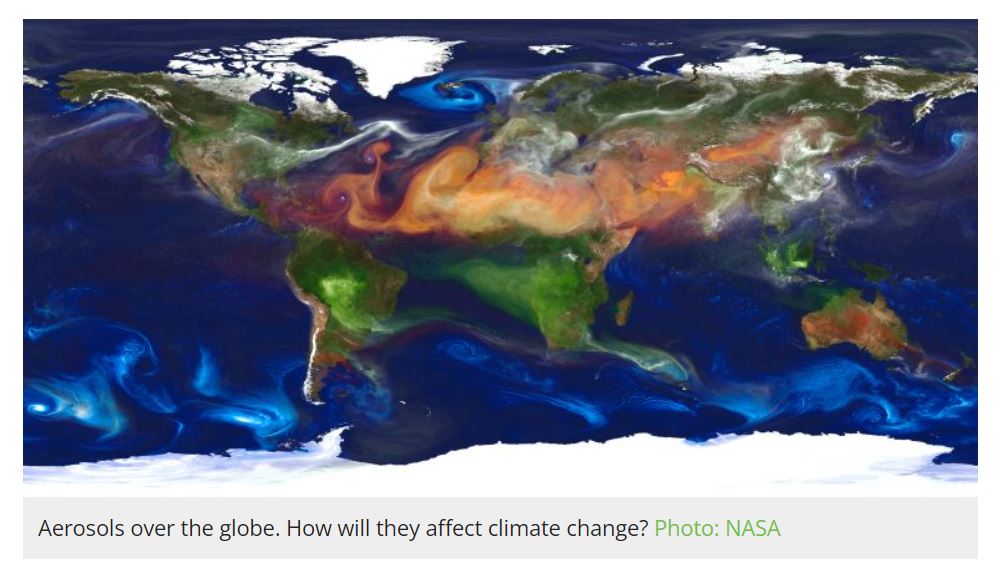 Certain evidence, however, is clear: global temperatures are rising, and humans are playing a role in it. And just because scientists are uncertain about some other areas, does not negate what they are sure about.
Certain evidence, however, is clear: global temperatures are rising, and humans are playing a role in it. And just because scientists are uncertain about some other areas, does not negate what they are sure about.
What’s certain and what’s not
Reputable climate scientists around the world are in almost unanimous agreement that human influences have warmed the atmosphere, ocean, and land and that the speed of the changing climate exceeds what can be attributed to natural variability. They are also virtually certain that this warming has been driven by the carbon dioxide and other greenhouse gases produced by human activities, mainly the burning of fossil fuels. Climate scientists are highly confident about these things because of fundamental principles of physics, chemistry, and biology; millions of observations over the last 150 years; studies of ice cores, fossil corals, ocean sediments, and tree rings that reveal the natural influences on climate; and climate models.
Despite this evidence, “In the climate change field, with its countless socioecological factors and interdependent systems, its known unknowns and unknown unknowns, deep uncertainty abounds,” said the World Resources Institute. The uncertainties are due to an incomplete understanding of Earth’s systems and their interactions; natural variability in the climate system; the limitations of climate models; bias; and measurement errors from imprecise observational instruments. In addition, there is great uncertainty about how the climate will be affected by humans and the demographic, economic, technical, and political developments of the future.
Join NNOCCI’s Governing Council!
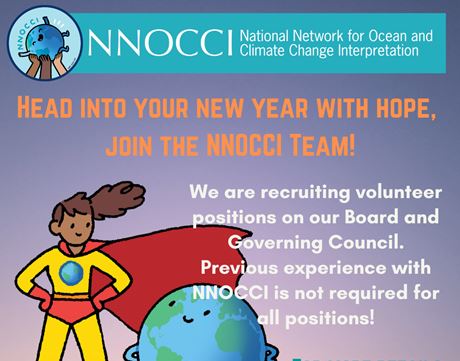 We are pleased to announce that applications are now open to join NNOCCI’s Governing Council, a group of committees actively engaged in sustaining, deepening and expanding NNOCCI’s work. We are currently recruiting for a variety of volunteer positions to join our committees, as well as a position within our Board of Directors:
We are pleased to announce that applications are now open to join NNOCCI’s Governing Council, a group of committees actively engaged in sustaining, deepening and expanding NNOCCI’s work. We are currently recruiting for a variety of volunteer positions to join our committees, as well as a position within our Board of Directors:
- Vice President
- Communications
- Impact and Evaluation
- JEDI (Justice, Equity, Diversity & Inclusion)
- Membership Engagement
- Science
- Training
Positions are open to all.
For full position descriptions, visit NNOCCI Governing Council Position Description
To apply, visit NNOCCI Governing Council Application
Applications are due by February 15th, 2023 @ 3 PM ET / 12 PM PT
Please contact
According to NOAA scientists, the global surface temperature for 2022 was the sixth highest since record keeping began in 1880. In a separate analysis of global temperature data also released today, NASA ranks 2022 as the fifth-warmest year on record, tying with 2015. Analysis from the Copernicus program ranked 2022 as the fifth-warmest year on record. December’s global surface temperature was the eighth highest in the 143-year record, according to NOAA.
2022 was the 5th warmest year on record for Florida.
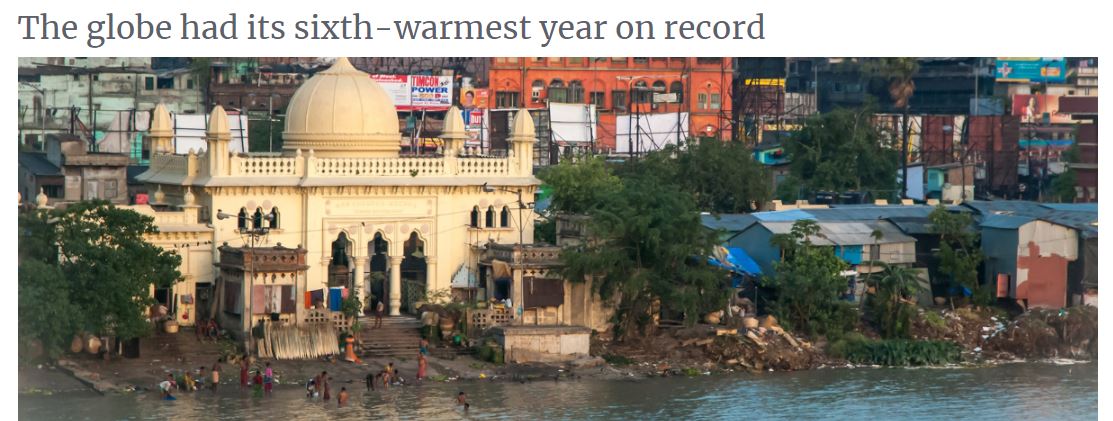 This summary from NOAA National Centers for Environmental Information is part of the suite of climate services that NOAA provides to government, business, academia, and the public to support informed decision-making.
This summary from NOAA National Centers for Environmental Information is part of the suite of climate services that NOAA provides to government, business, academia, and the public to support informed decision-making.
Details and information on global climate and temperature, rainfall, snow, and sea ice are available on NOAA's Assessing the Global Climate in 2022 webpage.
 Grants up to $4,000 available to Oak Ridge Associated Universities (ORAU) Consortium member universities
Grants up to $4,000 available to Oak Ridge Associated Universities (ORAU) Consortium member universities
ORAU’s FY 2023 Innovation Partnerships Program (formerly Events Sponsorship Grant Program) is being restructured to build stronger relationships between university members and ORAU subject matter experts. These updates are designed to focus on research and education topics that align well with ORAU’s expertise and current priorities.
Applications must be focused on one or more of the FY 2023 ORAU core focus areas.
An ORAU subject matter expert will serve as a collaborator with the university PI.
The goal of this grant program change is to drive new opportunities for university consortium members and ORAU experts to formulate meaningful collaborations.
Innovation Partnerships grant applications are currently being accepted and the application window will remain open throughout the fiscal year depending on available funds.
Each member university is limited to one award per fiscal year. Up to $4,000 may be requested to support an in-person or virtual event that involves participants from more than one ORAU member institution, including students. Innovation Partnership applications should focus on focused workshops/conferences that highlight your university’s strategic STEM research and education growth areas, and where collaborations with other member universities would add value. We are specifically interested in events that can bring more thought leadership in building a national strategy for STEM education and workforce development. Member universities are encouraged to collaborate around this topic in anticipation of federal funding initiatives.












